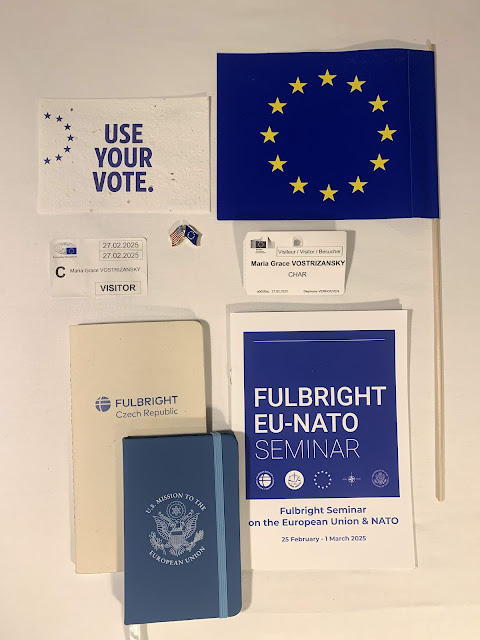Maria Vostrizansky is an English Teaching Assistant in the Czech Republic during the 2024-25 academic year. She teaches English at Gymnázium Jihlava, working with students aged 11 to 19. Maria graduated from Alma College, Michigan, in 2024 with a bachelor’s degree in Political Science and History and will pursue a Master of Arts in Law and Diplomacy at The Fletcher School, Tufts University, in 2025. Her research interests center on international relations, particularly the evolving roles of Eastern European countries in global diplomacy. Passionate about bridging cultural divides, Maria aims to inspire future generations to engage with pressing global challenges.
Photo: Maria, together with her Czech mentor and colleague Iveta Nečadová and her host school's Headmaster Pavel Suk, September 2024, Prague.
On our first evening in Luxembourg, we were welcomed by Elisabeth Bloxam and Erica Lutes from the Belgium Fulbright Commission. The reception at the U.S. Ambassador’s residence set the tone—welcoming, thoughtful, and focused on building connections. Dr. Jerome Sheridan’s introduction to the European Union (EU) helped center our focus for the week ahead. He talked about the EU not just as a political institution, but as a strong, ongoing multinational cooperation. That idea stuck with me as we moved through visits, panels, and discussions that brought law and policy off the page and into real-world context.
Photo: Outside the European Parliament, Brussels, February 2025.
The next day in Luxembourg we toured the European Court of Justice (ECJ), the judicial body of the EU. We were briefed on an ongoing case in meetings with General Court Judge Paul Nihoul, a Fulbright alumni, and President of the Court of Justice Koen Lenaerts, who shared insights into the ECJ’s role in shaping EU law and protecting fundamental rights. As someone interested in transitional justice and how law can help rebuild trust in divided societies, it felt meaningful to be there—not just as an observer, but as someone trying to understand how legal systems shape people’s lives. Afterwards, we were invited into the main courtroom of the ECJ where we observed a court hearing for an ongoing case involving the Italian government. Since the EU has 24 official languages, there were live interpreters translating the proceedings from Italian into different languages which as an audience member we could listen to by putting on headphones and selecting our preferred channel. It was incredibly insightful observing justice in the making! Last on the agenda for the day was a bus ride to the beautiful city of Brussels for the remainder of the week.
In Brussels, we visited the European Commission and the European Parliament. We learned about the Commission’s role in right of initiative, policy and budget implementation, being a guardian of treaties, and representation of the EU internationally. Our Parliament visit focused more on public engagement and the importance of democratic participation while maintaining similar values such as human dignity, rule of law, and human rights. In the evening, we had some free time to explore the historic capital and try some Belgian cuisine– waffles of course! One amazing aspect of the conference was the opportunity to meet other Fulbright grantees placed around EU member states and make wonderful connections stretching across Europe.
Photo: Picture with the Czech flag inside the European Parliament, Brussels, February 2025.
For our final day of the conference, I had the incredible opportunity visiting the North Atlantic Treaty Organization (NATO) Headquarters. The conference turned its focus from EU legislation to shaping transatlantic relations focusing on security, cooperation, and military deterrence at the heart of the most powerful and successful military alliance in the world. The sessions covered a wide range of topics, from traditional military strategy to newer challenges like climate change and cyber threats. One of our speakers was Jim Stokes, NATO’s Director of Nuclear Policy, who led a session on nuclear deterrence, offering insight into NATO’s strategic planning and its evolving role in global stability. A panel that stood out to me, examined at how environmental and security issues are becoming more connected. It made me think about how diplomacy today requires input from many fields—not just law or politics, but also science, economics, and ethics. Additionally, to my surprise, one of the framed photographs in NATO headquarters was the first President of the newly established Czech Republic, Václav Havel—a small but meaningful reminder of the country I now call home. Our final stop was the U.S. Mission to the EU, where we engaged in an open discussion with Foreign Service Officers about the realities of public service.
Photo: Seminar participants in NATO headquarters, Brussels, February 2025.
This seminar gave me a clearer picture of what it means to work at the intersection of law, diplomacy, and global cooperation. As I move on to the next step in my career—a Master’s in Law and Diplomacy at The Fletcher School at Tufts University in Fall 2025—I will carry the experience of the Fulbright EU-NATO Seminar with me. It reminded me that real progress happens when people come together—across institutions, cultures, and perspectives—to build systems rooted in accountability and peace. In many ways, that’s what Fulbright has given me—a chance to learn alongside others, build connections across borders, and understand how shared values can shape shared goals.





